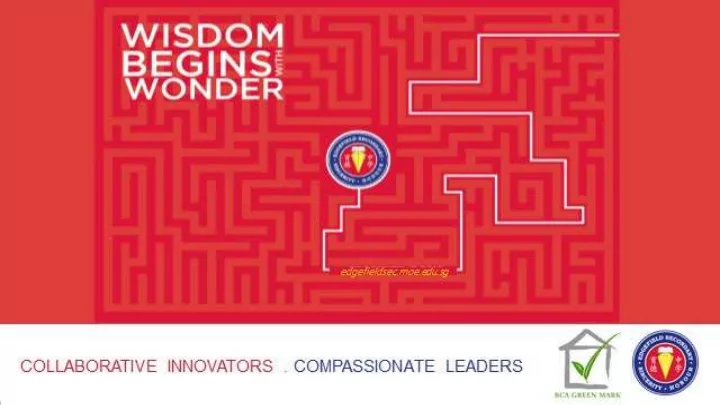

Science Department ❑ Vision & Mission ❑ Science Curriculum ❑ Curriculum Innovation
OurPurpose … Vision Trailblazers In Science Mission To develop in Edgefielders a deep understanding of the physical worlds and to be trend-setters of Science through innovative and applied technology
Science Curriculum Framework
Science Curriculum Framework Knowledge, Understanding and Application of • Scientific phenomena, facts, concepts and principles • Scientific vocabulary, terminology and conventions • Scientific instrument and apparatus including technique and aspects of safety
Science Curriculum Framework Skills Processes • Posing • Using apparatus questions • Creative problem-solving and equipment • Formulating • Planning investigation • Comparing hypothesis • Classifying • Decision-making • Defining the • Inferring problem • Analysing • Generating • Evaluating possibilities • Verifying • Predicting • Communicating • Observing
Science Curriculum Framework Ethics and Attitudes • Curiosity • Creativity • Objectivity • Integrity • Open-mindedness • Perseverance • Responsibility
Subjects offered (Express) Upper Secondary Upper Secondary Lower Secondary (Pure Sciences) (Combined Science) Thematic approach Biology Science (Phy, Chem) Chemistry Science (Bio, Chem) 3 disciplines (Biology/ Chemistry/ Physics Physics
Subjects offered (Normal Academic) Upper Secondary Lower Secondary (Combined Science) Science (Phy, Chem) Thematic approach (5076) 3 disciplines (Biology/ Science (Bio, Chem) (5078) Chemistry/ Physics
Subjects offered (Normal Technical) Lower Secondary Upper Secondary Module 1 Gadgets Work Wonder Module 4 Gadgets Work Wonder (I) (II) Module 5 Food Matters Module 2 Matter Around Us Module 6 Wonders Of My Body Module 3 Wonders Of My Body (II)
Curriculum Innovation • Vernier Video Physics • WriteFormula • Student Achievement Reflection • Applied Science Programme • Crystal Growing • PET Rocket • Herb and Spice Garden
Curriculum Innovation • Students used the App Vernier Experiential learning through Physics (Ipad) to learn about “Vernier Physics” Kinematics motion and graphs. • Level: Sec 3 Physics • Students capture the motion of moving bodies real time and view • Inquiry-based learning and analyse the kinematics instantly.
Curriculum Innovation • Experiential learning is the process of learning through experience, and is more specifically defined as "learning through reflection on doing“ . • Experiential learning actively involves the learner in a concrete experience . • D. Kolb helped to develop the modern theory of experiential learning, drawing heavily on the work of J. Dewey and J. Piaget.
Experiential Learning
Inquiry-based learning • Inquiry-based learning starts by posing questions, problems or scenarios—rather than simply presenting established facts or portraying a smooth path to knowledge. • Process is often assisted by a facilitator (at lower Inquiry level). Inquirers will identify and research issues and questions (at higher Inquiry level) to develop their knowledge or solutions.
Curriculum Innovation WriteFormula (collaboration with ETD) • Level: Sec 2 Chemistry • Impact of learning • Students will be using the App WriteFormula to learn about nomenclature and writing or identifying Chemical Formulae. • Pedagogical impact of Writeformula in differentiated learning components of student’s literacy in chemical formula using Game-based learning • Value added impact of students: chemical formula recognition, performance
Curriculum Innovation EDGEFIELD SECONDARY SCIENCE DEPARTMENT RESEARCH COLLABORATION With MOE ETD (wRiteFormula)
Data Visualisation for Classroom Teaching and Learning
Students Game Game Facilitating confused and teacher’s unmotivated in-class instructional adjustment Students Discovery- cannot grasp learning Feedback ionic delayed approach compound nomenclature Discovery- Teacher Data Visualisation learning s lecture approach Prepared by LICNDV team for presentation at LAK’17
wRiteFormula mobile app game ✓ ✗ Prepared by LICNDV team for presentation at LAK’17
wRiteFormula mobile app game Deduce rules Class discussion Group Play supported by data discussion visualisation 1 to 4 Increase difficulty level Prepared by LICNDV team for presentation at LAK’17
What is Data Visualisation? DATA VISUALISATION For sense-making and communication • That is readable and usable by teachers • Prepared by LICNDV team for presentation at LAK’17
Supporting classroom instruction with data visualization – Edgefield Secondary Negotiate targets and monitor attainment Edgefield Secondary Guide students to identify patterns Mr Alan Teo Mr Addie Siew Mr Seow Tzer Yeun Discuss common mistakes Prepared by Tzer Yeun for presentation at LAK’17 23
Applied Science: Lego Mindstorm Robotics ▪ By integrating IT and robotics activities into our science curriculum, we provide rich opportunities to engage our students in real world science and help them to develop conceptual understanding of scientific principles through the process of investigation, data analysis, engineering design and construction. ▪ In addition, using a mixture of collaboration and problem scenarios, students get to increase their motivation and their professional skills such as problem solving, team work and leadership.
Applied Science: Lego Mindstorm Robotics
Applied Science: PET Rocket
Applied Science: Herb and Spice Garden
Thank You
Recommend
More recommend